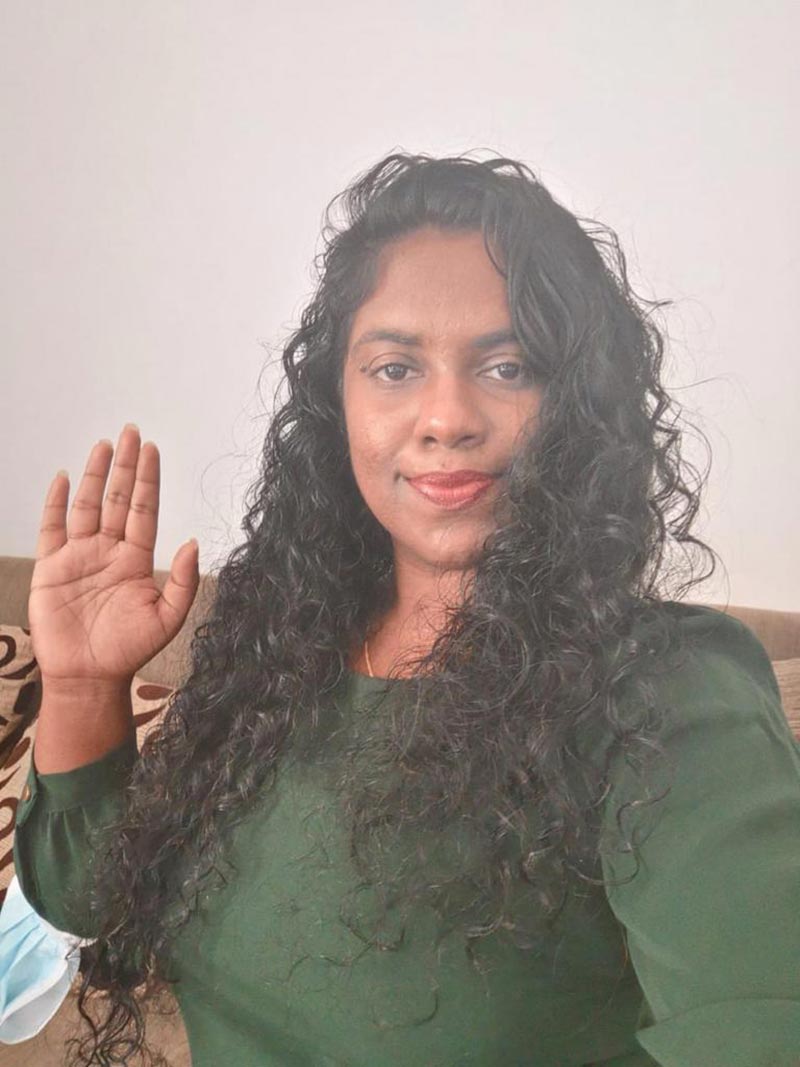
Choose to challenge: Meet the stereotype shattering women of Airtel Lanka
Sri Lanka currently ranks 126th out of 153 countries in terms of economic participation and opportunities for women in the workforce, according to the World Economic Forum.1
In recent years, overall female labour force participation actually regressed from 41% down to 36%, while female representation within science-based professions has recorded an equivalent reduction – particularly in fields of engineering and technology.
In an evolving economy these disparities actually represent a severe limitation on the potential for economic growth in Sri Lanka. This disparity is made even more serious given that women account for over 51% of Sri Lanka’s population but their current underrepresentation in technology means they will likely be among the groups most vulnerable to job losses as a result of the ongoing fourth industrial revolution (4IR).

However, according to the University Grants Commission (UGC), in 2017 alone, females accounted for 49% of the undergraduates enrolled to pursue an education in STEM, and over 40% of those who finally graduated from university.
Therefore, relatively speaking, the key challenge that Sri Lanka faces is not simply a lack of access to STEM education for women, but also the fact that women who are qualified, do not enter the workforce, or if they do, it is does not translate into a stable long-term career path in most instances.
Airtel, a global telecommunication services provider and one of Sri Lanka’s most sought after employers has been working across the board to enhance female participation within the telco in order to hone in on this massive reserve of untapped talent. Recognised as one of the ‘Top 10 Best Workplaces for Women’ in 2019 by Great Place to Work and with over 63% of the female workforce in managerial positions, Airtel has been driving home the advantages of providing an equal platform for employees to work, train and benefit from all of the telco’s core working areas.
Women taking the lead from the top
Having been part of the telco’s operations for over a decade, Airtel Lanka’s Chief Service Officer, Saumya Narain manages teams that work on design innovation, process automation and digital transformation. Saumya’s initial move to Airtel India in 2003 was a bold decision for her, given that she was switching verticals from banking to telecommunications.
“I studied commerce and came from a risk management background. So when I began my journey at Airtel, I had to restart my career ladder. Currently as CSO, I am responsible for ensuring that the entire customer lifecycle is designed and deployed effectively, and synchronized with back-end systems. This meant that I had to get to a grip on the rapidly evolving concepts of IT and telco-engineering, which was certainly intimidating at first. One of the main challenges was getting rid of the mental limitation that IT and tech was beyond my scope.”
In the years that followed, Saumya began to actively pursue every opportunity to deepen her technical understanding – attending online courses, seminars and webinars, and learning directly from Airtel’s own technical teams.
“This is where the beauty of Airtel really shines through. We had several mentors and leaders – including highly driven and successful women who encouraged us to set aside limitations we had internalised, and influenced me and many other female colleagues to rise through the ranks.
“The future is undoubtedly digital, and there is plenty of room for women to succeed in the telecommunications sphere. The only barrier to entry is knowledge, and with enough commitment, this is not a barrier at all. Especially with a company like Airtel that gives women the room and support they need to succeed both personally and professionally, I think the future for women in tech and design is bright,” she stated.
Breaking the gender barrier by centring woman
Airtel’s emphasis on diversity flows down into every level of the organization. A great example of this policy in practice is Chamila Silva who serves as Assistant Manager, Intelligent Network and is one of only four female intelligence networking engineers in the whole of Sri Lanka.
Chamila’s job requires her to be on call around the clock in order to ensure that the telco’s pre-paid payment systems are always running smoothly. Given that the vast majority of Airtel Lanka’s customers are young Sri Lankans on pre-paid connections, this work is critical to the telco’s overall performance.
Reflecting on her educational and professional journey into her present role as Assistant Manager in the Engineering domain, Chamila explains how her affinity towards STEM fields was sparked from a very young age.
“I‘ve always loved math and science, and in school these were areas which I excelled in. I also wanted to be different from others. Many of my classmates were not too interested in pursuing higher education, but I dreamt of using my knowledge to become more independent, and live my own life. Especially when I decided to pursue IT engineering, there were quite a few people who tried to discourage me saying that it wasn’t an appropriate field for a woman.”
“To be one of the few women working in this field was not easy and there were times when I wanted to quit, but I always persevered. My older brother is also in this field and he gave me a lot of encouragement and advice, and eventually those who had tried to discourage me had to come to the understanding that this has always been my passion, and that nothing would stop me from succeeding,” she explained.
Despite her qualifications with a B.Sc. in Computer Engineering from the University of Peradeniya and Cisco certification in Networking, Chamila noted that it took over a year before she could find a job that she was passionate about. Now, having completed her years with Airtel Lanka, Chamila is the primary caregiver and breadwinner for her family, in addition to pursuing her MBA at the Postgraduate Institute of Management.
Culturally, notions of what is gender appropriate is instilled even from a very early stage in life across the minds of young women and girls. These stereotypes tend to determine the educational and career choices for most women, taking away from the quality of their learning experience and limiting their educational and career choices.
Airtel Lanka is an equal employment opportunity provider and has taken strides and leaps in sustaining a truly global culture which is non-discriminatory and equal for all. The telco giant believes in creating a level playing field as women too have the potential to supersede beyond their aspirations and other milestones set by social norms, if they are provided with the same opportunities available to their male counter parts.
Elevating others through STEM
Airtel is also a firm believer in the power of technology and tech-related employment to create opportunity and ultimately, to empower a diverse workplace. The journey of Gayani Batawalaarachchi, attests to this fact. Currently hoping to pursue an education in computer sciences, Gayani was introduced to the telco as a result of Airtel’s partnership with the Employer Federation of Ceylon (EFC) to open up on-the-job training opportunities for persons with disabilities.
Gayani, who is visually impaired, completed her secondary education through the support of the Ceylon School for the Deaf and Blind, situated in Ratmalana. For her vocational education Gayani joined with the EFC to obtain training in the fundamentals of computing, the internet and Microsoft Office. This training helped pave the way for the young recruit to apply for her current position at Airtel.
“Growing up I never expected to join the workforce, let alone work with computers and for this I am thankful to Ms. Manique Guneratne from the EFC who trained and encouraged me to apply for jobs. Through their training programmes, we were given access to special applications like JAWS – which is a computer screen reading programme with text to speech output. This helped me to start getting comfortable with technology and computers.”
“Everyone I’ve worked with at Airtel has been very friendly and helpful, and after working here, I really feel that I need to continue working and learning. When applying for the position at Airtel, I too had the same hiring process as anyone else who would have filled in for the position. Of course I had to go through an initial selection process with the EFC. I have truly been able to benefit from the flexible working environment and the on-the-job training that I have received during my time at Airtel,” says Gayani.
Gayani also acknowledges the support she had received from a very young age especially from her family and school. She credits this support system for encouraging her to pursue her vocational education and her career. As her training in ICT with the EFC helped to open up more employment opportunities, moving forward, Gayani hopes to use her time at Airtel to learn more about technology, and eventually pursue further educational qualifications in the field.
This is only a glimpse into the lives of some of the powerful women at Airtel who work tirelessly behind the scenes addressing not only customer requirements but also social and economic issues with the use of mobile technology. As the global telco giant continues to reinforce its commitment to establish the ‘new normal’ through an inclusive and diverse workplace, the company has been able to serve an increasingly diverse customer base. A gender-diverse workforce allows the company to attract and retain talented men and women who are at the centre of the telco’s global drive to not leave anyone behind but to create a workplace that is equal and beneficial for all.
1 Global Gender Gap Report 2020



